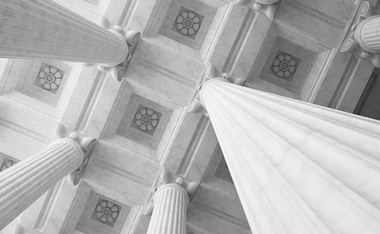The views expressed in our content reflect individual perspectives and do not represent the authoritative views of the Baha'i Faith.
Why do religions have laws? The spiritual laws of every Faith guide us toward the Creator, but what about the social laws of various religions?
All religious laws start on one major premise, as cited in the Baha’i Prayer on Marriage by Abdu’l-Baha: “I have not created spirits and men, but that they should worship Me.” This phrase is originally from the Qur’an, but even earlier we have the First Commandment from the Torah: “I Am the Lord thy God, and thou shalt have no other gods before me.”
All God-given laws proceed from this premise—the idea that we show our love and worship of God first by acknowledging Him, and second by obeying His laws. “Love Me, that I may love thee,” the law of love and reciprocity, as stated by Baha’u’llah in The Hidden Words, has been repeated by all of God’s saints and messengers. Baha’u’llah continued that admonition and invitation with, “If thou lovest me not, My love can in no wise reach thee,” to make the point clear:
O Son of Being! Love me, that I may love thee. If thou lovest me not, my love can in no wise reach thee. Know this, O servant. – Baha’u’llah, The Hidden Words, p. 4.
God’s laws have come to humankind through His educators, His prophets and messengers, who appear from age to age to update and guide humanity to greater heights of spiritual and moral civilization. As we can see on the news every day, signs of the moral decay of humanity assault us every second and there are too many examples of bad human behavior to summarize. Our vaunted material civilization is the source of as many evils as it is good. We need a new set of spiritual and moral laws, and the Baha’i teachings have brought them.
Every criminal, civil and common law is underpinned by natural, spiritual and moral ones, no matter their source. That is, spirituality and morality have to do with the inward and outward expression of human virtues such as kindness, generosity, fairness, love, wisdom, knowledge, courage, temperance, justice and so on. Our outward actions and words affect society, yet it is by our actions and our inner perfections that we are judged worthy by God. There is no end to the perfections we can acquire spiritually and can demonstrate by word, deed and thought.
Abdu’l-Baha highlighted the differences between material and spiritual civilization, and in that context pointed out the moral benefit of spiritual laws:
See then how wide is the difference between material civilization and divine. With force and punishments, material civilization seeketh to restrain the people from mischief, from inflicting harm on society and committing crimes. But in a divine civilization, the individual is so conditioned that with no fear of punishment, he shunneth the perpetration of crimes, seeth the crime itself as the severest of torments, and with alacrity and joy, setteth himself to acquiring the virtues of humankind, to furthering human progress, and to spreading light across the world. – Selections from the Writings of Abdu’l-Baha, p. 133.
In different ages of the progression of God’s one religion the messengers of God, His chosen ones, revealed laws and ordinances relative to the people and society in which they appeared. This was done in accordance with humankind’s growing capacity to absorb more and more of God’s never-exhausted will and progressive design. Every time the founder of a new Faith appeared was the Day of God for that age and that time, until the next one revealed himself and ushered in a new Day of God and a new age, with varying laws and ordinances, exhortations and guidance to fit the current state of human progress.
In a direct sense, we, humanity, are as God’s child, growing through the stages of childhood to youth to adulthood. In each of those stages, we are able to comprehend more and do more in all ways for our own good and that of others.
Baha’is believe Baha’u’llah’s appearance and public declaration in 1863 marked another new religious dispensation, with people everywhere building “an ever-advancing civilization” by first spiritually transforming their own characters:
The first duty prescribed by God for His servants is the recognition of Him Who is the Dayspring of His Revelation and the Fountain of His laws, Who representeth the Godhead in both the Kingdom of His Cause and the world of creation. Whoso achieveth this duty hath attained unto all good; and whoso is deprived thereof hath gone astray, though he be the author of every righteous deed. It behooveth everyone who reacheth this most sublime station, this summit of transcendent glory, to observe every ordinance of Him Who is the Desire of the world. These twin duties are inseparable. Neither is acceptable without the other. Thus hath it been decreed by Him Who is the Source of Divine inspiration. – Baha’u’llah, The Most Holy Book, p. 19.
We all know that in order to get, you must give. To receive the blessings of God we can first acknowledge that all His divine messengers speak for Him, and we can then recognize and try to follow their directions.
















Comments
Sign in or create an account
Continue with Googleor